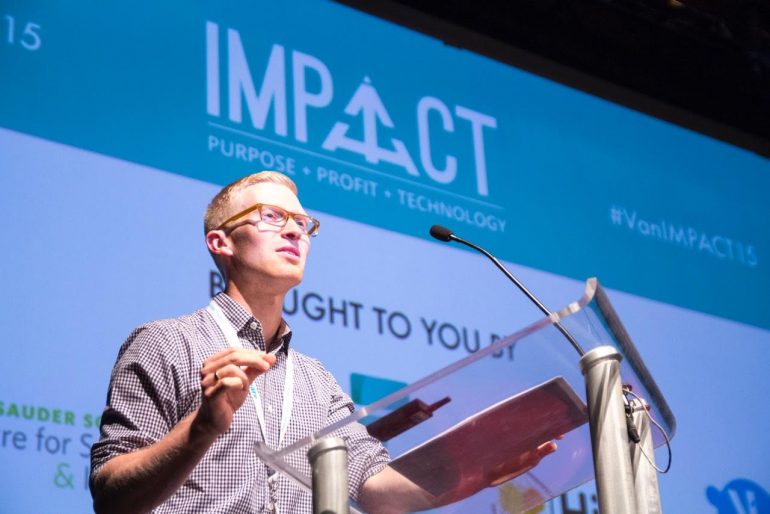Driven by purpose as well as profit? You might have joined hundreds of earnest entrepreneurs, non-profit folks and investors gathered at Van IMPACT 2015 yesterday at the Imperial in downtown Vancouver. A consistent theme: using technology and startup principles to drive organizations that want to change the world (ideally while earning a fair return).
Seth Maxwell on growing like a for-profit, doing good like a non-profit
Thirst Project founder Seth Maxwell’s team raises money to dig wells to provide clean drinking water for people in developing countries. Their viral campaigns are tied to educating people not just online, but at presentations at schools and other public forums. Speaking at the event, he laid out why this is a great time to find a and build communities for your cause.
“Today we’re seeing one of the most educated, under-employed and caring generations that’s ever been, the millennials,” Maxwell said. “A generation ago, education shifted from a focus on ABCs and 1-2-3s to sharing and caring – and the result is that we’re more socially conscious than ever before.”
How does a social venture get the credibility they need for success to separate from the pack? “Stringent standards. When you look at something simple like where you buy coffee, if the company makes good coffee, there’s credibility in the product.” Building that great product comes from measuring results, so you can see where you’re getting traction and take it further. That’s where social ventures can learn from the tech startup community in how they measure and use data.
Lessons from the impact investing panel
Leaders in the impact investing community came together to discuss how impact investing is shaking up the investment landscape – perhaps not as quickly as most in the room would have liked.
“If impact investing is a movement, it’s a question of numbers,” said Stephanie Cohn Rupp, CEO of Toniic, a self-described global action committee for impact investors. “We’re at the embryonic stages. The movement hasn’t started in earnest. If you talk to a middle-income person about impact investing, it will fall on deaf ears. Right now, this is still the game of the very wealthy. Impact investors are high net worth; the one percent.”
“Right now, it’s harder for your average retail investor to find vehicles to back their favoured causes, but the opportunities are out there if you do your research,” noted Christie Stephenson, western Canadian anchor with Purpose Capital.
For investors, it’s harder to measure social impact compared with more traditional business inputs and outputs — but that’s where using the tools pioneered by the tech community comes in handy, said Bonnie Foley-Wong, founder of Pique Ventures. “There’s often not a lot to analyze due to little previous track record, which is why I’ve spent a lot of time developing an analytic process and tools borrowing from the LEAN startup Canvas model and more. It helps to capture negative externalities, looking at wider groups and helping answer the question: is this really an impact business and how much impact can it have?”

